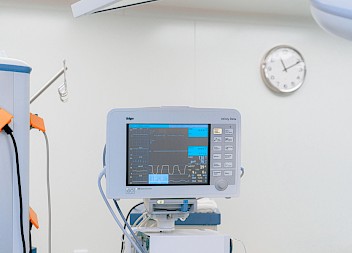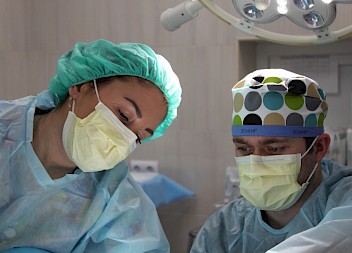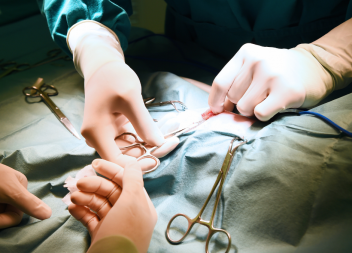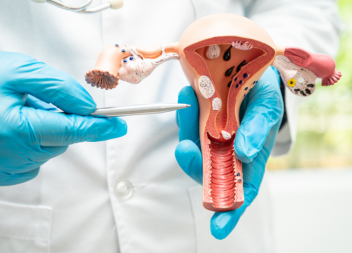A woman in her 40s was awarded £330,000 compensation after her ureter was cut and she was inadvertently sterilised during gynaecological surgery at Royal Bolton Hospital.
The claimant ‘C’ was supported in bringing a medical negligence claim by Medical Solicitors’ director, Caroline Moore, who specialises in gynaecology claims.
Since 2016, our client had been suffering with persistent pelvic pain and heavy periods which was found to be due to enlarging cysts on both ovaries. She had initially decided against surgery, opting for hormone medication to control symptoms. However, when her pain worsened over a 12-month period, she changed her mind and agreed to have the cysts surgically removed.
C was never informed of the potential risk of ureteric damage during keyhole surgery. The ureter is one of the tubes that carry urine from the kidneys to the bladder. Ureters are delicate structures at risk of being easily cut during medical procedures relating to the pelvis. Therefore, surgeons are expected to take precautions to protect the ureters during gynaecological procedures.
C was advised that her ovaries would only be removed if absolutely necessary; she was 38 and already had three children but wanted to expand her family.
About the injury
In February 2018, during the two-hour operation, the gynaecological surgeon found a large endometrioma, also called a ‘chocolate cyst’ on C’s right ovary that instantly burst. This type of cyst is filled with menstrual blood and usually linked to endometriosis, but no other evidence of endometriosis was found. The surgeon concluded that it was actually a haemorrhagic cyst (an ovarian cyst that bleeds) which would not impact C’s chance of becoming pregnant again.
C had significant scar tissue connecting the bowel to the top of her womb, preventing the left ovarian cyst from being easily removed. A colorectal surgeon was called to remove some of the scar tissue to allow for better visualisation of the ureters. These were found to be normal and separate from the cyst.
During recovery, C was told the surgery had gone well without complications. The left cyst had been drained and the right cyst had been removed. Her pain had subsided somewhat and was manageable with painkillers. She was discharged the following day.
However, a few days later she went to A&E at Pennine Acute Hospital in Manchester with abdominal pain and vomiting. The on-call gynaecology SHO prescribed C antibiotics and advised for her to attend a gynaecology assessment back at Bolton. Two days later our client went to A&E at Bolton Hospital with increasing abdominal pain.
A CT scan showed two large abscesses in the pelvis, signs of infection in the abdomen, a swollen kidney filled with urine, and both lungs partially collapsed. The abscesses were drained which confirmed the fluid build-up was urine. This indicated that a ureter had been damaged during the keyhole surgery. It was found to have been completely cut through the middle and C needed further surgery to reconnect (reimplant) the ureter to the bladder.
How our client was affected by the injury
C developed incontinence that requires long-term medication. Due to scar tissue, C’s ureter had become restricted and she underwent dilation in 2022. She will probably need further urological procedures in the future, including life-long Botox injections.
C will also never be able to fall pregnant naturally again after the surgeon unknowingly removed part of C’s fallopian tube during the cyst removal. This led to the breakdown of her relationship and depression. She admitted that she feels like life isn’t worth living at times but carries on for her three children who help care for her.
C had been experiencing periods of excruciating pain that radiate from her back into her abdomen and down her stomach. Caroline sought the opinion of a pain expert to explain why C had pain in her back despite there being nothing wrong with C’s spine on X-rays and MRI scans. The pain expert felt C had developed a chronic post-operative pain disorder associated with psychological and social dysfunction. After the urological dilation procedure in December 2022, C had felt some relief from some pain symptoms but was expected to continue to suffer some degree of ongoing chronic pain symptoms. It was hoped some further improvements might be achieved with ongoing rehabilitation.
The Defendant Trust admitted liability early on in the claim which enabled Caroline to apply for interim payments – those being sums of money paid before the full and final agreement was reached. This meant that C could begin private rehabilitation to manage, and improve, both her physical and psychological pain.
The case eventually settled out of court in January 2023 at £330,000. This included £100,000 in general damages for C’s pain and suffering during the surgery, and subsequent infertility, chronic pain and further procedures. The compensation also included special damages (i.e., financial losses past and future) for, amongst other things, past care and rehab costs and future life-long medical expenses.
Please Note: At Medical Solicitors, we can deal with urology injury claims involving healthcare providers in England and Wales and will be happy to extend a helping hand if your case is located in either of these regions. Unfortunately, we cannot handle urology injury cases outside of England and Wales.






